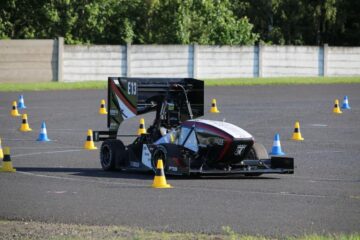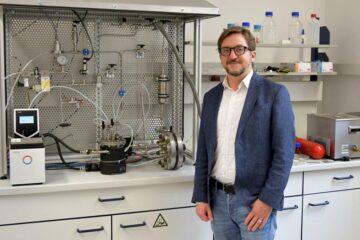Symmetry violation and the origin of matter: Experts discuss absence of symmetry under time reversal

About 15 internationally acknowledged scientists in the fields of theoretical and experi-mental physics from various prestigious research centers in Europe are meeting at the workshop „T Violation and CPT Tests“ from April 15 to 16, 2013 in Mainz. The partici-pants discuss the latest research results concerning the origin of matter.
At the center of the meeting is the physical problem of symmetry breaking and eventually the question about the impact of the big bang on the creation of matter. The workshop is hosted by the MITP, an institution of the Cluster of Excellence „Precision Physics, Fundamental Interactions and Structure of Matter“ (PRISMA) at Johannes Gutenberg University Mainz in Germany.
Up to this point, it is not clear why more matter than anti-matter evolved following the big bang. Today, hardly any anti-matter can be found in space. When anti-matter is con-fronted with matter in the process of creation, anti-matter gets directly destroyed. The reason for this imbalance between matter and anti-matter is related to the violation of the so-called CP symmetry („charge parity“). The CP symmetry claims that all processes in physics are equally possible when matter is exchanged with anti-matter and space-reflection occurs. CP-breaking processes, based on the fundamental CPT-symmetry theorem, also imply a violation of the transformation of time reversal (T).
At the MITP workshop, the participants discuss the first direct measurement of breaking time reversal symmetry in the system of neutral B mesons at the BABAR experiment of the Stanford Linear Accelerator Center (SLAC) in the U.S. Moreover, the results from the Stanford test are being discussed in relation with symmetry-breaking experiments on time reversal in neutral kaon systems conducted at CPLEAR (CERN, Geneva) and at the KLOE Electron Positron Collider (DAFNE, Italy). Another thematic focus is set on discussing the sensitivity of current CPT tests and on the prospects of these measure-ments.
The current workshop is the second of its kind offered by the MITP this year. „Our events are an important component of our work to enable top physicists from all over the world to share their knowledge and thus arrive at new insights,“ explained Tobias Hurth, scientific coordinator of the MITP. Around 250 scientists are working together in the new research association which receives about EUR 35 million of federal funding over the next five years. PRISMA deals with fundamental questions concerning the basic elements of matter and their meaning for the physics of the universe. The MITP is one of the core initiatives of the cluster with the goal of establishing an international theory center. The next major event hosted by the MITP will be the workshop on „Theoretical issues of cosmic rays and photons from dark matter“ taking place in Schloss Waldthausen near Mainz from June 29 to July 2, 2013.
Further information:
Professor Dr. Matthias Neubert
Founding Director of MITP and Head Coordinator of the PRISMA Cluster of Excellence
Institute of Physics – Theoretical High Energy Physics
Johannes Gutenberg University Mainz (JGU)
D 55099 Mainz, GERMANY
phone +49 6131 39-23681
fax +49 6131 39-24611
e-mail: neubertm@uni-mainz.de
http://wwwthep.physik.uni-mainz.de/site/people/neubert/
Weitere Informationen:
http://www.prisma.uni-mainz.de
– PRISMA Cluster of Excellence
http://www.mitp.uni-mainz.de/
– Mainz Institute for Theoretical Physics (MITP)
http://indico.cern.ch/conferenceDisplay.py?confId=244839
– workshop
Media Contact
Weitere Informationen:
http://www.uni-mainz.deAlle Nachrichten aus der Kategorie: Veranstaltungsnachrichten
Neueste Beiträge

Ideen für die Zukunft
TU Berlin präsentiert sich vom 22. bis 26. April 2024 mit neun Projekten auf der Hannover Messe 2024. Die HANNOVER MESSE gilt als die Weltleitmesse der Industrie. Ihr diesjähriger Schwerpunkt…

Peptide auf interstellarem Eis
Dass einfache Peptide auf kosmischen Staubkörnern entstehen können, wurde vom Forschungsteam um Dr. Serge Krasnokutski vom Astrophysikalischen Labor des Max-Planck-Instituts für Astronomie an der Universität Jena bereits gezeigt. Bisher ging…

Wasserstoff-Produktion in der heimischen Garage
Forschungsteam der Frankfurt UAS entwickelt Prototyp für Privathaushalte: Förderzusage vom Land Hessen für 2. Projektphase. Wasserstoff als Energieträger der Zukunft ist nicht frei verfügbar, sondern muss aufwendig hergestellt werden. Das…





















